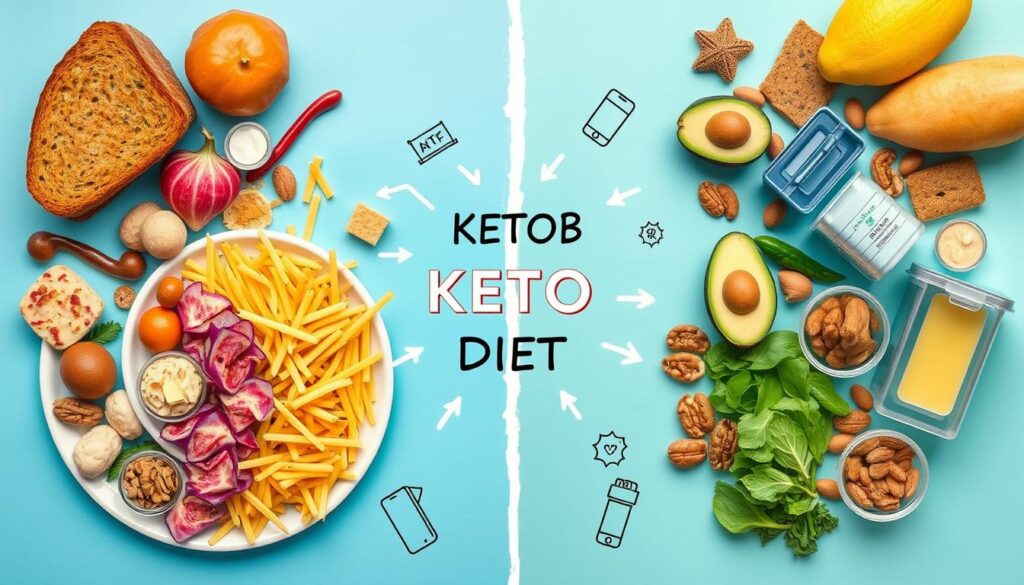Could the secret to a healthier gut be in the high fat low carb ketogenic diet? This diet is getting more popular and research shows it might help your gut health a lot.
But how does it affect the complex world of our gut microbiome? Let’s explore how the keto diet could change your gut health and improve your overall wellness.
Key Takeaways
- The ketogenic diet is a high-fat, low-carb eating plan that puts the body into a metabolic state of ketosis.
- Emerging research suggests the keto diet can positively impact gut health by modulating the composition and diversity of the gut microbiome.
- Potential benefits of the keto diet for gut health include reduced inflammation, improved digestion, and better regulation of the immune system.
- Specific gut bacteria and their byproducts, like short-chain fatty acids, may be influenced by the keto diet in ways that support overall wellbeing.
- Implementing the keto diet for gut health requires careful consideration of the right foods, supplements, and lifestyle factors.
Understanding the Ketogenic Diet Fundamentals
The ketogenic diet is a way of eating that focuses on high fat and low carbs. It puts your body into a state called ketosis. In ketosis, your body uses fat and ketone bodies for energy instead of glucose.
This happens when you eat very few carbs usually 20 to 50 grams a day. This is in a diet of 2000 kcal per day.
What is Ketosis and How it Works
Ketosis is when your body uses fat for energy instead of carbs. This idea was first seen by Russell Wilder in 1921. He used the ketogenic diet to treat epilepsy.
When you eat fewer carbs, your liver makes ketone bodies from fat. These ketone bodies are more efficient at making ATP, the energy cells need.
Macronutrient Ratios on Keto
In a ketogenic diet, you eat about 55% to 60% fat. You also eat 30% to 35% protein and 5% to 10% carbs. This mix helps keep your body in ketosis and burning fat for energy.
Benefits of Fat Adaptation
When your body gets fat-adapted, it burns fat more efficiently. This leads to better energy, brain function, and overall health. But, starting a ketogenic diet can have side effects like digestive issues and vitamin deficiencies.
It’s also linked to a higher risk of heart disease. Always watch your health and talk to a doctor before starting a ketogenic diet.
The Connection Between Gut Health and Overall Wellness
Gut health is key to our overall wellness. It affects many bodily functions. The gut microbiome, filled with trillions of bacteria, fungi, and more, helps with digestion, immunity, and even our mood.
A healthy gut helps us absorb nutrients better, reduces inflammation, and fights off pathogens. When our gut is balanced, we digest food well, have strong immunity and might even feel happier and more focused.
But, an unhealthy gut can lead to many problems. This includes digestive disorders, autoimmune conditions and even neurological issues. So, keeping our gut healthy is vital for staying well and living long.

A healthy gut is the foundation for overall health and well-being. – Dr. Sarah Ballantyne, author and gut health expert
The ketogenic diet, with its high fat, low-carb foods, can change our gut’s balance. It’s important to understand how the ketogenic diet affects our gut health to improve our overall wellness.
Ketogenic Diet for Gut Health Scientific Evidence and Research
Research shows the ketogenic diet can greatly improve gut health. It does more than help with weight loss. This diet, rich in fats and low in carbs, changes the gut microbiome. It also reduces inflammation and boosts metabolic health in the digestive system.
Impact on Gut Microbiome
The ketogenic diet changes the gut microbiome for the better. It grows good bacteria like Akkermansia muciniphila. This bacteria helps keep the gut healthy and improves metabolic health.
The diet’s low-carb nature also lowers harmful bacteria. These bacteria are linked to inflammation and insulin resistance.
Inflammation Reduction Studies
Many studies prove the ketogenic diet reduces gut inflammation. It limits foods that cause inflammation and boosts anti-inflammatory compounds. This helps people with conditions like Crohn’s disease and ulcerative colitis.
Metabolic Benefits for Digestive System
The ketogenic diet’s metabolic effects are good for the gut. It improves insulin sensitivity and lowers blood sugar. This leads to better digestive function and a healthier gut.
The diet also boosts energy metabolism and strengthens the gut barrier. This is thanks to ketone bodies produced by the diet.
| Metric | Ketogenic Diet | Low Sugar Diet |
|---|---|---|
| Fat Mass Loss | 2.9 kg | 2.1 kg |
| Cholesterol Changes | Increased LDL particles | Decreased LDL cholesterol |
| Gut Microbiome | Decreased diversity, reduced Bifidobacteria | No significant changes |
| Glucose Tolerance | Decreased | No significant changes |
The ketogenic diet significantly improves gut health. It changes the gut microbiome, reduces inflammation, and boosts metabolic health. Yet, more research is needed to fully understand its long-term effects. Individual results may vary.
Essential Foods for a Gut Healthy Keto Diet
Starting a keto foods journey for better gut health needs a smart plan. The ketogenic diet helps burn fat and cuts hunger. It also boosts your digestive system. To keep your gut healthy on keto, eat lots of low-carb, nutrient-rich foods.
Leafy greens like spinach, kale, and arugula are key for a keto foods diet. They’re full of fiber, vitamins, and minerals. These nutrients help your gut work well and feed good bacteria.
Cruciferous veggies like broccoli, cauliflower, and Brussels sprouts are great too. They have sulforaphane, which strengthens your gut and fights inflammation.
- Avocados: They’re full of healthy fats and fiber, helping with digestion and gut health.
- Nuts and seeds: Almonds, walnuts, chia, and flaxseeds offer nutrients, fiber, and anti-inflammatory benefits.
- Fatty fish: Salmon, mackerel, and sardines have omega-3s, which improve gut health and reduce inflammation.
- Fermented foods: Sauerkraut, kimchi, and unsweetened yogurt or kefir are rich in probiotics, balancing gut bacteria.
Eating these keto foods in your gut-healthy diet feeds your digestive system. It keeps the keto diet’s benefits. A varied and nutrient-rich nutrition plan is essential for good gut health on keto.

Maintaining a balanced gut microbiome is crucial for overall health, and the keto diet can play a key role in supporting this.
Common Gut Issues and How Keto Addresses Them
The ketogenic diet is seen as a good way to tackle gut health problems. It cuts down on inflammation and boosts good gut bacteria. This can help with symptoms of leaky gut syndrome, inflammatory bowel disease, and other digestive disorders.
Leaky Gut Syndrome
Leaky gut syndrome makes the gut more open, leading to health problems. Research shows keto can make the gut barrier stronger and reduce inflammation. It does this by cutting carbs and eating more fat, which helps good bacteria grow.
Inflammatory Bowel Conditions
Crohn’s disease and ulcerative colitis are chronic inflammation in the gut. Studies indicate keto’s anti-inflammatory effects can ease symptoms. It does this by cutting out foods that cause inflammation and boosting anti-inflammatory compounds.
Digestive Disorders
Keto is also good for people with digestive disorders like IBS and SIBO. It helps by avoiding foods that trigger symptoms like pain and bloating. It also helps the gut microbiome, improving digestion.
The ketogenic diet is a strong option for gut health issues. It reduces inflammation, strengthens the gut, and changes the gut microbiome. Always talk to a healthcare professional before starting keto, especially if you have health concerns.
Implementing the Ketogenic Diet for Optimal Gut Health
To start a keto implementation for gut health optimization, cut down on carbs. Increase healthy fats and eat moderate amounts of protein. Choose whole, unprocessed foods and add low-carb veggies for fiber. Drinking enough water and keeping electrolytes balanced is key during the transition.
Adjusting the ketogenic diet for your gut health needs is important. Watch your macronutrient intake and listen to your body. This helps find the right nutrient balance for ketosis and a healthy gut.
Here are some key steps to consider when implementing the ketogenic diet for optimal gut health:
- Gradually reduce carbohydrate intake to reach a state of ketosis, typically between 20-50 grams of net carbs per day.
- Focus on consuming a variety of low-carb, high-fiber vegetables such as leafy greens, broccoli, cauliflower, and zucchini.
- Increase healthy fat intake from sources like olive oil, avocado, nuts, and seeds to reach the recommended 70-80% of total calories.
- Maintain adequate protein intake, typically around 15-20% of total calories, to support muscle mass and overall health.
- Stay hydrated and replenish electrolytes like sodium, potassium, and magnesium to prevent keto flu symptoms.
- Monitor your body’s responses, such as energy levels, digestion, and any changes in gut-related symptoms, to optimize the diet for your individual needs.
By following these guidelines and making adjustments as needed, you can implement the ketogenic diet in a way that supports both your overall health and the health of your gut microbiome.

| Nutrient | Keto Diet | Standard Diet |
|---|---|---|
| Carbohydrates | 5-10% of total calories | 45-65% of total calories |
| Protein | 15-20% of total calories | 10-35% of total calories |
| Fat | 70-80% of total calories | 20-35% of total calories |
The gut microbiome is a complex ecosystem that plays a crucial role in our overall health. By implementing the ketogenic diet in a thoughtful and strategic way, we can support both our gut health and our body’s ability to enter a state of ketosis.
Supplements and Support Products for Gut Health on Keto
Keeping your gut healthy is key when you’re on a keto diet. A good keto meal plan gives you many nutrients that help your gut. But, supplements can give your digestive system an extra boost. Let’s look at the main supplements and products that can help your gut health on keto.
Probiotics and Prebiotics
Probiotics are live bacteria and yeasts that are good for your gut. They help keep the balance of good bacteria in your gut. Prebiotic fibers feed the probiotics, helping them grow. Adding both probiotics and prebiotics to your keto diet can make your gut health even better.
- Choose a probiotic supplement with many different strains, like Lactobacillus and Bifidobacterium.
- Find prebiotic fibers like inulin, galacto-oligosaccharides GOS, and resistant starches to help your probiotics grow.
Essential Nutrients
Some vitamins and minerals are very important for gut health. Supplements with these nutrients can be especially helpful for those on a keto diet.
| Nutrient | Recommended Daily Amount | Importance for Gut Health |
|---|---|---|
| Magnesium | 310-420 mg | Helps with digestion and keeps your gut moving |
| Omega-3 Fatty Acids | 500 mg EPA + DHA | Lessens inflammation and keeps your gut barrier strong |
| Vitamin D | 600 IU | Boosts your immune system and increases gut diversity |
Make sure to pick high-quality keto supplements. Always talk to a healthcare professional before adding them to your routine.
Keeping your gut healthy is vital for your overall well-being. Supplements can be a great addition to a ketogenic lifestyle.
Potential Challenges and Solutions
Starting a ketogenic diet for better gut health can be tough at first. But, with smart strategies, you can overcome these hurdles. Digestive issues like constipation or diarrhea often happen as your body gets used to the new diet. To help, slowly switch to the diet and eat enough fiber from veggies. You might also need digestive enzymes or bile acid supplements.
Another keto challenge is less short-chain fatty acid production. This affects the fuel for good gut bacteria. To fix this, eat foods high in resistant starch like oats and green bananas. Also, try high-carb re feed meals with veggies or fruits now and then.
People on a ketogenic diet might also face food intolerance issues. This can happen because of eating the same foods over and over. It’s key to watch how your body reacts and eat a variety of whole foods. This helps keep your gut health in top shape.
| Challenge | Solution |
|---|---|
| Digestive discomfort constipation, diarrhea |
|
| Reduced short-chain fatty acid production |
|
| Food intolerances |
|
By tackling these challenges, you can make the most of the ketogenic diet. This will help your gut health and overall health a lot.

Tracking Progress and Measuring Success
It’s important to keep an eye on how your ketogenic diet is working for your gut health. By watching key health markers and using different tracking methods, you can learn a lot. This helps you see how your body is reacting to the diet changes.
Digestive Health Markers
Some key health markers to watch include:
- How often and how well you go to the bathroom
- Any bloating or discomfort
- Your energy levels and overall feeling of well-being
Monitoring Methods
To track your progress, try using a few different methods:
- Food Diaries: Write down what you eat to spot any foods that might upset your gut.
- Symptom Tracking Apps: Use apps to log your symptoms and bowel movements over time.
- Periodic Consultations: Meet with your healthcare provider or a dietitian regularly to check on your progress.
- Microbiome Testing: Get tested periodically to see how your gut bacteria are changing.
- Blood Work: Your doctor might suggest blood tests to check your metabolic markers, which can show how your gut is doing.
By regularly tracking your progress and watching your health markers, you can make better choices. This helps you adjust your diet and reach your gut health goals.
Conclusion
The ketogenic diet might help improve gut health. It can reduce inflammation and support good bacteria in the gut. This could lead to better digestion overall.
But, it’s key to eat enough nutrients and adjust as needed. Always talk to a doctor before making big changes to your diet, especially if you have health issues.
The ketogenic diet benefits include losing weight and managing some health conditions. But, it’s important to think about how it affects the gut microbiome. Eating less fiber can be a problem for some people.
So, finding a balance is best. This way, you can enjoy the diet’s benefits while keeping your gut healthy. This is especially true if you want to improve your gut health.
In the end, the ketogenic diet has both good and bad sides for gut health. Knowing the details and listening to your body can help. This way, you can use the diet to improve your digestion and health.





